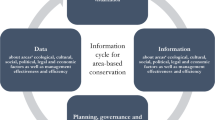Abstract
This article depicts the initial human–environmental relations that prevailed during the pre-modern period of Soqotra’s history prior to its incorporation into a state-led modernization process and its subsequent enclosure within a United Nations-designed conservation zoning plan and ecotourism economy. The term ecological primordialism is coined to highlight the primacy of the environment as the enabling and constraining context for the constitution of the Soqotran community. It entails a symbiotic relationship between an ecosystem and a human social system, which structured the contingent relations between the raw materials for livelihood making and community formation: people, resources and space. The article elucidates how Soqotrans managed this mostly constraining human–environment nexus through a series of adaptive practices: their taxonomic appropriation and practical domestication of the island’s environmental resources; their transformation of the landscape into a domain of livelihood; their organization of dispersed settlements into a socio-political unit; their demarcation of the island into geographical zones of cultural differentiation; and their establishment of mutual aid institutions that simultaneously regulated resource use while integrating all islanders into relations of social kinship. The article concludes with a cautionary tale about the use of anachronistic human–environment relations as the basis of conservation policy.





Similar content being viewed by others
Notes
A caveat: here and throughout this article the Soqotri terms reflect merely a sample of the many regionally divergent dialects spoken throughout the island.
References
Bent, T., & Bent, M. (1900). Southern Arabia. London: Smith, Elder & Co.
Brown, G. H. (1966). Social and economic conditions and possible development of Socotra. Aden: Federal Government Mission Report.
Brown, G., & Mies, B. A. (2012). Vegetation ecology of Socotra. Heidelberg: Springer.
Cheung, C., & De Vantier, L. (2006). Socotra: A natural history of the islands and their people. Hong Kong: Odyssey.
Elie, S. D. (2008). The waning of Soqotra’s pastoral community: Political incorporation as social transformation. Human Organization, 67(3), 335–345.
Elie, S. D. (2009). State-community relations in Yemen: Soqotra’s historical formation as a sub-national polity. History and Anthropology, 20(4), 362–393.
Elie, S. D. (2012). From ethnography to mesography: A praxis of inquiry for a postexotic anthropology. Qualitative Inquiry, 19(3), 219–231.
Elie, S. D. (2014a). Qāt consumption in Soqotra: Diaspora formation and cultural conversion. Northeast African Studies Journal, 14(1), 1–42.
Elie, S. D. (2014b). Soqotra’s pastoral economy: From core to auxiliary livelihood. Pastoralism: Research Policy and Practice, 4(15), 3–15.
Elie, S. D. (2014c). Pastoralism in Soqotra: External entanglements and communal mutations. Pastoralism: Research Policy and Practice, 4(16), 3–19.
Elie, S. D. (2016). Communal identity transformation: From status hierarchy to ethnic ranking. Northeast African Studies Journal, 14(2), 23–66.
Ellen, R. (1994). Modes of subsistence: Hunting and gathering to agriculture and pastoralism. In T. Ingold (Ed.), Companion encyclopedia of anthropology: Humanity, culture and social life (pp. 197–225). New York: Routledge.
Galaty, J. G., & Johnson, D. L. (1990). The world of pastoralism: Herding systems in comparative perspective. New York: Guilford Press.
Government of Yemen (GoY). (2000). Socotra Archipelago master plan. Sana’a: MoPD.
Miller, A., & Morris, M. (2004). Ethnoflora of the Soqotra Archipelago. Edinburgh: Edinburgh University Press.
Morris, M. (2002). Soqotra Archipelago: Manual of traditional land use practices. Edinburgh: Royal Botanic Garden.
Naumkin, V. (1993). Island of the Phoenix: An ethnographic study of the people of Socotra. Reading: Ithaca Press.
Netting, R. B. (1986). Cultural ecology (2nd ed.). Illinois: Waveland Press.
Serjeant, R. (1992). The coastal population of Socotra. In B. Doe (Ed.), Socotra: Island of tranquility (pp. 130–180). London: Immel.
Stavenhagen, R. (1998). Cultural rights: A social science perspective. In H. Niec (Ed.), Cultural rights and wrongs. Paris: UNESCO Publishing.
United Nations Development Programme (UNDP). (2006). Socotra Archipelago: Proposal for inclusion in the world heritage list of UNESCO. Sana’a: UNDP and Ministry of Environment and Water.
Van Damme, K., & Banfield, L. (2011). Past and present impacts on the biodiversity of Socotra Island (Yemen): Implications for future conservation. Zoology of the Middle East, 3, 31–88.
Wellsted, J. R. (1835). Memoir on the island of Socotra. Journal of the Royal Geographical Society of London, 5, 129–229.
Whitehead, N. L. (1998). Ecological history and historical ecology: Diachronic model. In W. Bale (Ed.), Advances in historical ecology (pp. 30–41). New York: Columbia University Press.
Author information
Authors and Affiliations
Corresponding author
Ethics declarations
Conflict of interest
It does not present any potential conflicts of interest with any other party
Human and animal rights
The article did involve research with human participants (through interview) for which they provided their full consent.
Rights and permissions
About this article
Cite this article
Elie, S.D. Ecological primordialism: the human–environment nexus in Soqotra. GeoJournal 83, 897–913 (2018). https://doi.org/10.1007/s10708-017-9810-y
Published:
Issue Date:
DOI: https://doi.org/10.1007/s10708-017-9810-y




